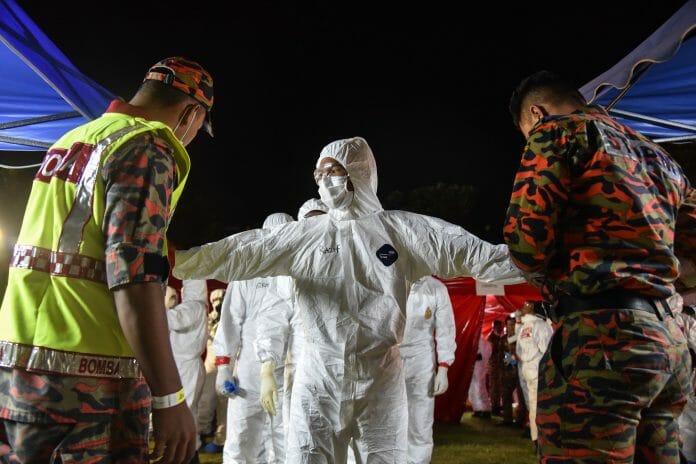
Pursuant to the decision by the Government to impose the Movement Control Order (MCO) nationwide from 1 to 14 June 2021, manufacturing and manufacturing related services (MRS) sectors that are listed in the attached Appendix 1 are allowed to operate, subject to approval letter from the Ministry of International Trade and Industry (MITI) which can be downloaded from the COVID-19 Intelligent Management System (CIMS) 3.0.
For sectors other than manufacturing and MRS, companies are required to refer to the relevant ministries regulating their sectors or the National Security Council (MKN). It is to be underscored that MITI is not mandated to provide approval for sectors apart from manufacturing and MRS.
The manufacturing and MRS sectors allowed to operate are to ensure minimal disruption to the supply chain of critical parts, components and finished products. This is essential to support the continued operations of critical infrastructures and frontliners such as security, healthcare systems, information and communications and as well as ensure adequate supply of basic necessities for the Rakyat.
Effective Sunday, 30 May 2021, 8.00 pm manufacturing companies that have already registered with CIMS 3.0 are required to download the new MITI approval letter and where necessary, update their workers’ list. For manufacturing companies that have yet to register, submission can be made beginning Monday, 31 May 2021, 1.00 pm. Details on how to register at CIMS 3.0 (via notification.miti.gov.my) can be accessed tthrough www.miti.gov.my.
In addition, workers in the manufacturing and MRS sectors will be required to present MITI’s approval letter, together with their company-issued letter of employment or staff identification card, to the enforcement authorities to enable their movement to and from their work premises.
The current Standard Operating Procedures (SOPs) on work force capacity remains at 60 percent. Manufacturers in sectors allowed only for warm idle mode are also required to download the MITI approval letter via CIMS 3.0, subject to a maximum work force capacity of 10 percent.
Manufacturing and MRS sectors that are allowed to operate must ensure strict adherence to the SOPs by MKN and MITI. Failure to comply with the SOPs is a serious offence and may result in fines and/or closure of premises. To ensure effective compliance with the SOPs, comprehensive and stringent enforcement will be carried out by Federal and State enforcement agencies.
In addition, workers in the manufacturing and MRS sectors will be required to present MITI’s approval letter, together with their company-issued letter of employment or staff identification card, to the enforcement authorities to enable their movement to and from their work premises.
The current Standard Operating Procedures (SOPs) on work force capacity remains at 60%. Manufacturers in sectors allowed only for warm idle mode are also required to download the MITI approval letter via CIMS 3.0, subject to a maximum work force capacity of 10%.
Manufacturing and MRS sectors that are allowed to operate must ensure strict adherence to the SOPs by MKN and MITI. Failure to comply with the SOPs is a serious offence and may result in fines and/or closure of premises. To ensure effective compliance with the SOPs, comprehensive and stringent enforcement will be carried out by Federal and State enforcement agencies.
Capacity (60% workforce):
1. Aerospace including maintenance, repair and overhaul (MRO)
2. Food and beverage
3. Packaging and printing materials
4. Personal care products and cleaning supplies
5. Healthcare and medical care including dietary supplement
6. Personal Protective Equipment (PPE) including rubber gloves, and fire safety equipment
7. Medical equipment components
8. Electrical and Electronics
9. Oil and Gas, including petrochemical and petrochemical products
10. Chemical products
11. Machinery and equipment
12. Textiles for manufacturing of PPE only
13. Production, distillation, storage, supply and distribution of fuels and lubricants
Warm Idle (10% workforce):
1. Automotive (vehicles and components)
2. Iron and Steel
3. Cement
4. Glass
5. Ceramics








